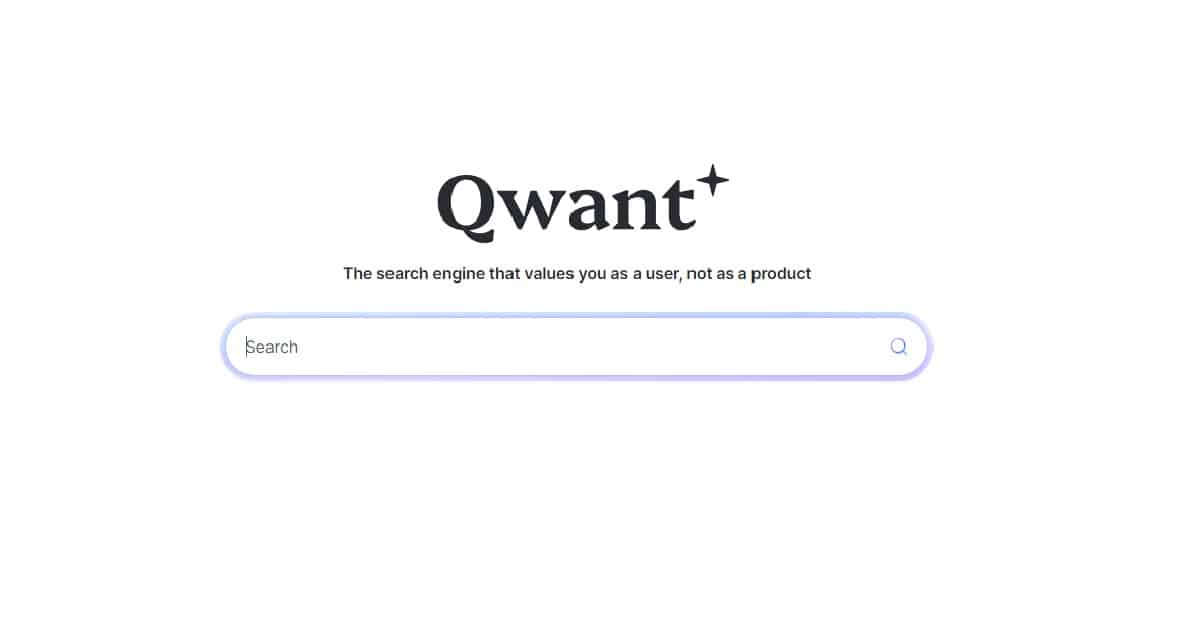Search engine Qwant
It is important for every website owner on the Internet to keep up with developments in the search engine sector. Google is still the titan in this field and is difficult to knock off its throne. It has an almost absolute monopoly on all search engine traffic. For most websites, a good percentage of monthly visitors come from the search engine. Both via paid and organic results. In this blog post, we look at the French search engine Qwant.
Qwant is a French search engine that was founded in 2013 with the main goal of protecting user privacy. While many search engines, such as Google, use user data to display targeted advertising and provide a personalized experience, Qwant takes a different approach. Qwant presents itself as a privacy-friendly alternative and promises not to collect or track users' personal data.
Privacy versus data orientation
The biggest difference between Qwant and Google is how they handle user data: Google is based on a data-driven model. It collects personal information such as search history, location and online activity.
This data is used to personalize the search experience and serve targeted ads, which is an important part of Google's revenue model. Qwant, on the other hand, does not use cookies to track users and store their search history. Qwant's goal is to provide users with neutral search results without compromising their privacy. You will still see advertising, but it will be related to the search term rather than your personal search history.
Results and algorithms
In addition to privacy, the search algorithms of Qwant and Google also differ. Google uses complex algorithms that customize search results based on the user's personal interests.
Google works with a huge amount of data and machine learning to make predictions about what users are looking for even before they have entered the full search term. Qwant also uses algorithms to rank search results, but the focus here is on delivering unfiltered and neutral search results, without the influence of personal preferences or search history. This can lead to less personalized but more objective results.
User experience
Google offers a wide range of services that are integrated into search, such as YouTube, Google Maps and Google Shopping, creating a strong ecosystem. As a result, Google remains the most user-friendly option for many users.
Qwant also integrates with other Google apps and services, so switching to what the user wants to see is a breeze. Qwant offers a clean interface with no targeted advertising and tries to take a minimalist approach. There is also a child-friendly version, Qwant Junior, which focuses on safe searching for younger users.
How Qwant deals with advertising
Qwant also displays advertising, but this is not based on user profiles. The ads you see on Qwant are contextual, meaning they are based on the search query you are typing, rather than an in-depth analysis of your online behavior.
This sets Qwant apart from search engines like Google, which focus their ads heavily on analyzing user data. As a website owner, you can take advantage of this by advertising on this search engine, as it mainly caters to a French user base, which remarkably is also identified as upper class, i.e. higher income users. So if your target audience is in this range, this could be an interesting party to allocate advertising budget to and thus attract users to your website hosting.
Qwant's market share in Western Europe
Although Qwant is becoming increasingly well-known, especially in France and other European countries, its market share is still small compared to Google. Google dominates the search engine market in Europe with a share of more than 90%. Qwant only has a small share, between 0.5% and 2% depending on the country.
In France, where Qwant is most successful, the search engine is visited 6 million times a month and used 150 million times. The European Union is pushing for more privacy and independence from the US tech giants, and this has helped Qwant gain some ground, especially in government institutions and schools, where the use of Qwant instead of Google may be mandatory.
However, Google's popularity remains undiminished due to the seamless integration of its products and services. Qwant offers an interesting alternative for people who place more value on privacy and objective search results, but in terms of ease of use, results and integration with other services, Google remains the absolute market leader. The challenge for Qwant is to appeal to a larger audience, although its success in France shows that there is a market for privacy-oriented search engines in Europe. One advantage Qwant has over DuckDuckGo is that this search engine is based entirely in France.
So in this way you are supporting the European market. Do you already use a search engine other than Google? What is your favorite in this area? Let us know!
